This is indeed the first memory I have of Hawking. I recall with all the clarity of a Freudian 'screen memory' his quite astonishing progress down the walks of Cambridge in his iconic wheelchair in the early 80s - leaving everyone else far behind in more ways than one. I am sure there are many, many others who have the same visual image imprinted in their minds. At that time, though, I was a mere gawping graduate student who did not imagine that I'd ever have the chance to actually converse with Hawking. But I did get this extraordinary opportunity.
I met Hawking when he came to India in January 2001. (In the interests of full disclosure, I should confess that the only reason for this was serendipitous. It was my husband, Ranjit Nair and his organization, the Centre for Philosophy and the Foundations of Science, who invited Hawking to Delhi.) The rest of this piece consists of three or four fragments of remembrance that I have treasured ever since.
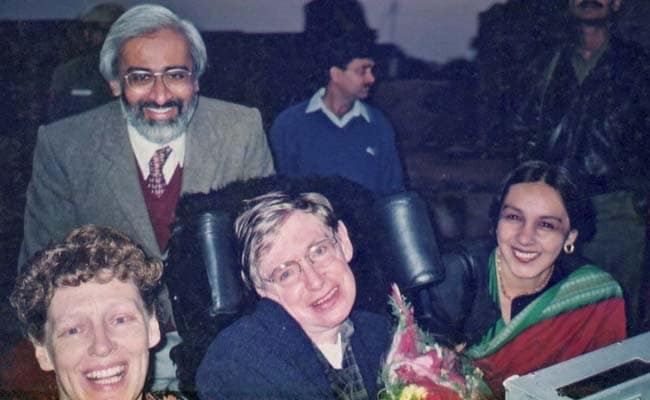
With Stephen Hawking in New Delhi (2001)
Next, we are at a small sit-down dinner in a posh Delhi hotel. My husband and Hawking are engaged in debating the completeness of physics and the redundancy of further research on the subject in about 20 years. This is with reference to a bet that Hawking had offered at a meeting in Rashtrapati Bhawan with the President of India and that Ranjit now took him up on. What about poetry? I piped up at some point during this animated interchange and waited breathlessly while the answer appeared, first on Hawking's silvery computer screen and then were rendered in a distant, metallic - one might even say, oracular - American voice by his speech synthesizer.
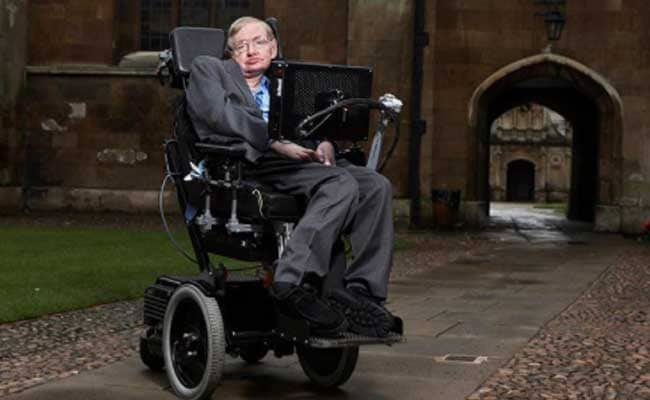
Stephen Hawking encouraged interest in space where he believed humankind's destiny lay
Poetry, like physics, is indeed redundant in the sense that we do not really need the rhythms of poetry or the laws of thermodynamics for any reasons of physical survival. If all the poems and theorems on earth were suddenly to disappear, we would continue to breathe, eat, walk and talk. Yet, in an important sense, we might lose an intangible but priceless aspect of human endeavor through the ages - that is, the attempt by humankind to transcend the routines and divisions of everyday life and reach out to strange, 'unifying' metaphysical 'truths', to invent concepts such as 'black holes' in order to illuminate the structures of the universe. That such imaginative truths are crucial to our existence was well understood by a long line of thinkers, sometimes called gurus in the Indian tradition. And it was understood by Hawking, a guru par excellence, albeit one with an almost Zen sense of the absurd.
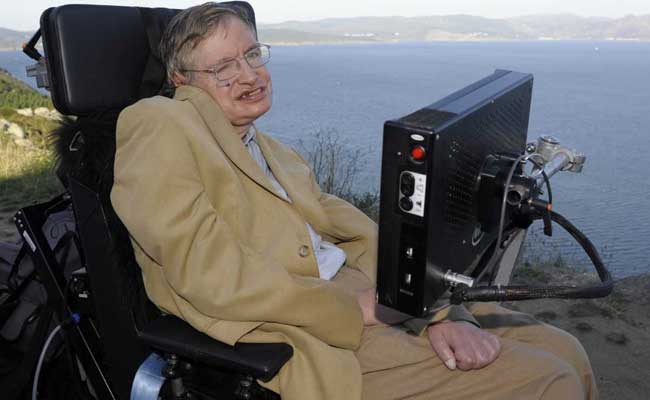
Stephen Hawking answered questions with the help of a voice synthesiser
Since Hawking came to Delhi in January, it was calendar-time and so it was that I presented Elaine Hawking the 'Kali for Women' diary for the year 2001. None too seriously, this 'feminist diary' had imposed on its bemused authors, including myself, the following brief: "...to recast the business... of making predictions on the basis of sun/star/moon/signs, of conjunctions and aspects, colours, days and dates - and come up with something different." I tried at the time, as best I could, to explain to Elaine the possibly subversive value of such wacky woman's humour. Meanwhile, Stephen listened intently from his wheel chair. This in itself was not surprising, for he had begun his own public lecture at Siri Fort by drawing certain distinctions between the predictive practices of astrology and his own area of astronomy. But what happened next caught me off guard - for Stephen had typed up a single, stark question on his screen.
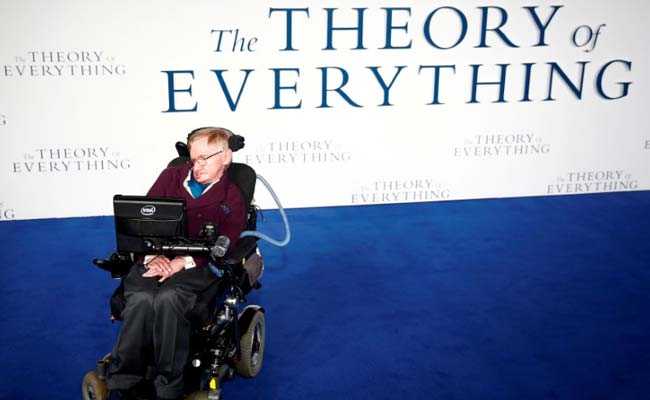
Stephen Hawking at the UK premiere of the film "The Theory of Everything" (December, 2014)
How is the past to be interpreted and retold, not just by feminists but by physicists, philosophers and others? It was this question that Stephen Hawking addressed in his bestseller "A Brief History of Time". To me, the most remarkable aspect of this book is that it seeks sunnily to explain to a lay audience the abstract laws that govern the universe. In this sense, like Feynman's "Lectures on Physics", it displays an enthusiastic faith that we can all stretch our minds to entertain even the most abstruse of ideas, a stance which seems to me touchingly hopeful. This is also probably why Hawking, top-notch physicist, wrote boisterous sci-fi books for children with his daughter Lucy about other planets, and why he would bother to engage with odd strangers such as myself who could, in effect, belong to quite another planet.
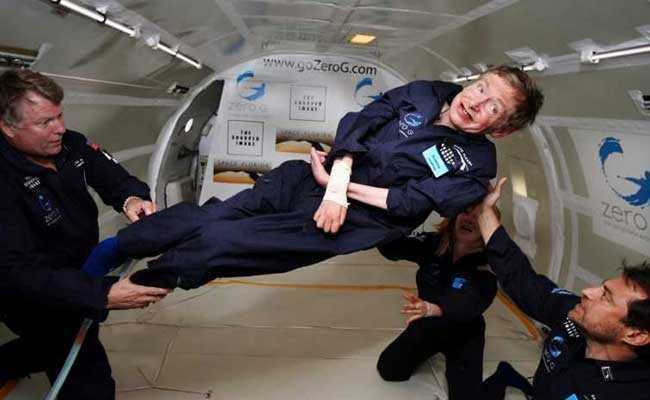
Stephen Hawking on a special "zero-gravity" jet in 2007
The Third Eye
(for Stephen Hawking)
Shiva knows no Bhangra
Nor the Punjabi Rap
But he's a divine dancer
Who never takes a nap
And if for a single trillionth of a second
Shiva ceased to dance
All the world's great cities would quiver
On a knife-edge of chance
Every star in the universe would
Cease to burn
Neither sun nor earth
Would turn
Matter grow
So dense
So intense
The dark
That your
Cry
Would
Die
On a windless night
In the lap of the sea
When Shiva sleeps
You will know eternity
A few years later, I published this poem but never sent it on to Hawking. That would have been redundant. What can never be redundant is Hawking's indomitable spirit, evident even in such passing encounters with him as I had. As a scientist, he exemplifies for me the best of the humanities, of what it can mean to be someone who lived almost his whole adult life entirely dependent on other humans for physical help but whose mind was ever independent, questing and transcendent.*
* I would like to thank the journals Seminar and Biblio in which some versions of the above reminiscences appeared over a decade and a half ago. 'The Third Eye' was published in my poetry collection Yellow Hibiscus (Penguin, 2004).
(Critical theorist and writer Rukmini Bhaya Nair is a professor at IIT Delhi. She is the author of several academic books and is one of India's best known contemporary poets.)
Disclaimer: The opinions expressed within this article are the personal opinions of the author. The facts and opinions appearing in the article do not reflect the views of NDTV and NDTV does not assume any responsibility or liability for the same.


